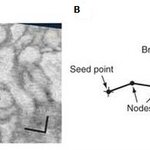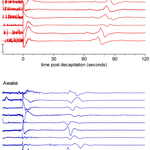Neuroscience

The brain is quite complex (talking about an understatement), with its billions of neurons with many connections between them. These neurons and their connections form an intricate three-dimensional structure which forms the seat for cognition, awareness and much more. Its intricacy, however, also makes mapping it a daunting challenge. Nevertheless, there are some research groups that have put themselves to the task (for example, the Human Brain Project). The latest news comes from the Max Planck Institute for Medical Research, in Heidelberg, Germany, where a research team has developed a new…

Age does a lot of things to us. And to our brains, which shrink when we grow older. Those incredibly complex neural networks inside our skulls not only shrink, but they also become more susceptible to scourges such as dementia and Alzheimer’s disease. People who do not suffer from these cognitive dysfunctions, also show aging effects in their brains, such as the accumulation of amyloid-beta plaques.
To trace the evolutionary roots of the aging brain, researchers have previously investigated whether similar effects occur in the brains of rhesus monkeys (which diverged from the ‘human…

A perhaps somewhat lugubrious study, published in PLoS ONE, set out to investigate whether decapitation is a humane method of euthanasia in small animals, such as rats and birds. To do this, they used 22 rats that were decapitated while an EEG was recorded. Of these rats, 9 were awake and 8 were anesthetized (5 rats lost the electrodes during the experiment).
Not surprisingly, the EEG lost power fast and globally and decreased to about half the initial value in about 4 seconds after the decapitation. Where the EEG markedly differed between both groups before the ‘death sentence’ was carried…

New neurological research, using, of course, the ever-popular giant axon of squid, shows that neurons are pretty darn clever at picking signal out of noise. And what's more, they're sensitive to context:
Neurons are often compared to transistors on a computer, which search for and respond to one specific pattern, but it turns out that neurons are more complex than that. They can search for more than one signal at the same time, and their choice of signal depends on what else is competing for their attention.
Take that, transistors! Neurons are way smarter than you.
Well, at least squid…

Sometimes a person who gets drunk can perform functions their friends might regard as ordinary, like carrying on a conversation or driving a car - but the drunkard might have no memory of those things and those periods of amnesia, commonly known as "blackouts", can last from a few minutes to several hours.
Researchers writing in the Journal of Neuroscience say they have identified the brain cells involved in blackouts and the molecular mechanism that appears to underlie them. Exposure to large amounts of alcohol does not necessarily kill brain cells as once was thought, they say, …

We've all had an Asian person say, 'All you Americans look alike' - but they aren't being racist, there may be some biology at work.
The brain works differently when memorizing the face of a person from one's own race, according to a study which used EEG recordings to measure brain activity and which may shed light on one of the most replicated psychology findings - that people are less likely to remember a face from a racial group different from their own.
"Scientists have put forward numerous ideas about why people do not recognize other-race faces as well as same-race faces," says…

How easy is it to falsify memory? Perhaps as easy as a little bit of social pressure, according to research at the Weizmann Institute.
In a forthcoming Science study, they show a unique pattern of brain activity when false memories are formed – one that hints at a surprising connection between our social selves and memory.
The experiment took place in four stages. In the first, volunteers watched a documentary film in small groups. Three days later, they returned to the lab individually to take a memory test, answering questions about the film. They were also asked how confident…

In the immortal Richard Donner classic "Scrooged", the following exchange takes place between Frank, the president of the network, and his boss, Preston:
Preston: Do you know how many cats there are in this country?Frank: No, ummmm...I don't have...no.Preston: Twenty-seven million. Do you know how many dogs?Frank: ...in America?Preston: Forty-eight million. We spend four billion on pet food alone.Frank: Four...?!Preston: I have a study which shows that cats and dogs are beginning to watch television. If these scientists are right, we should start programming right now.…

Songbirds have been used in the past to examine the precursor functions to human language in our neural circuitry, but they may be capable of much more than being animal models.
A new study shows the Bengalese finch (Lonchura striata var. domestica) can learn the rules of an artificial grammar system - hierarchical language structure has been previously thought to be specific only to humans.Kentaro Abe and colleagues tested whether songbirds could use information about syntax in the syllables of natural birdsong to discriminate between songs. They also taught the birds artificial…

It's rare that you will find me arguing for gender quotas. Obviously I am not for discrimination but, at least in science, mandating representation - which is discrimination against the qualified in the interests of sex organs - does not lead to better science, it leads to equality at the expense of excellence.
Economics, however, is not science and some mandated equality might help. Science says so.
But discussing biological differences between men and women are a no-no in the progressive world of science, so one must tread lightly. Saying positive things about…